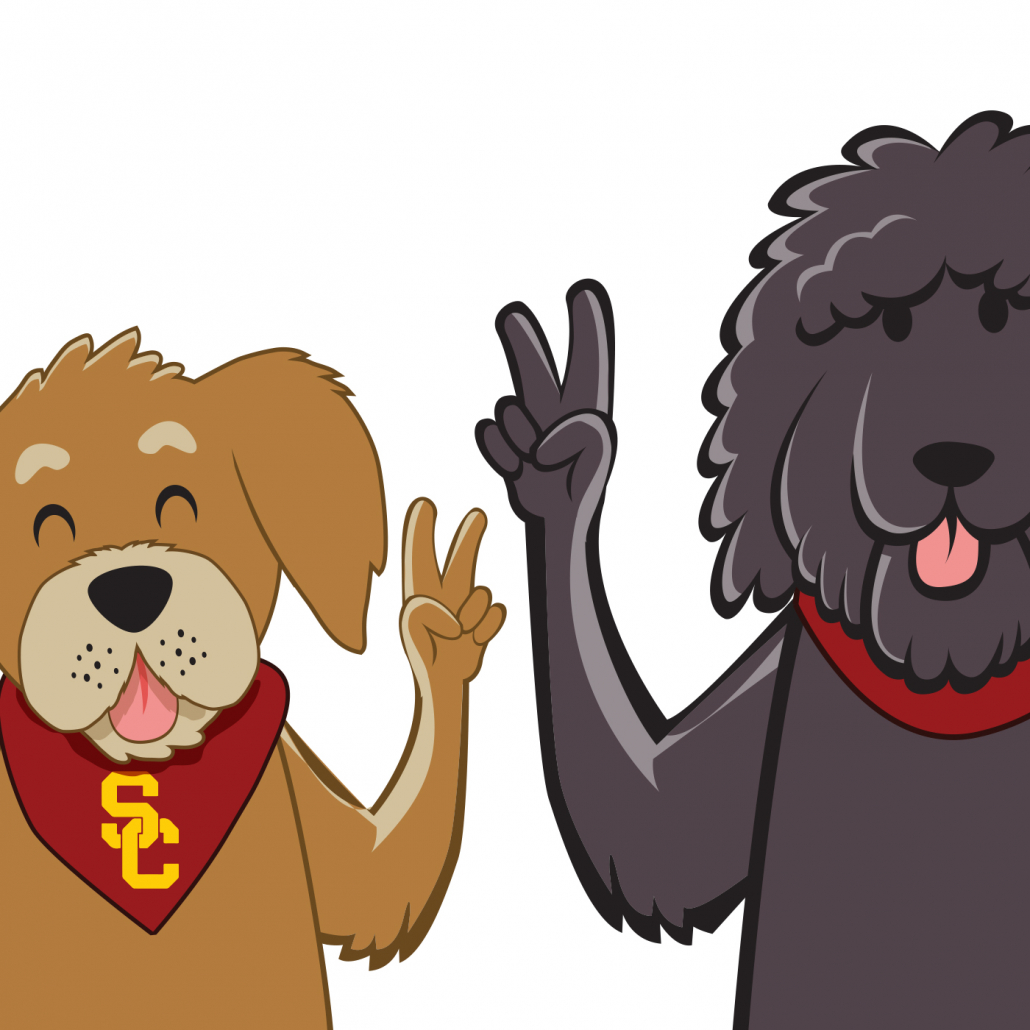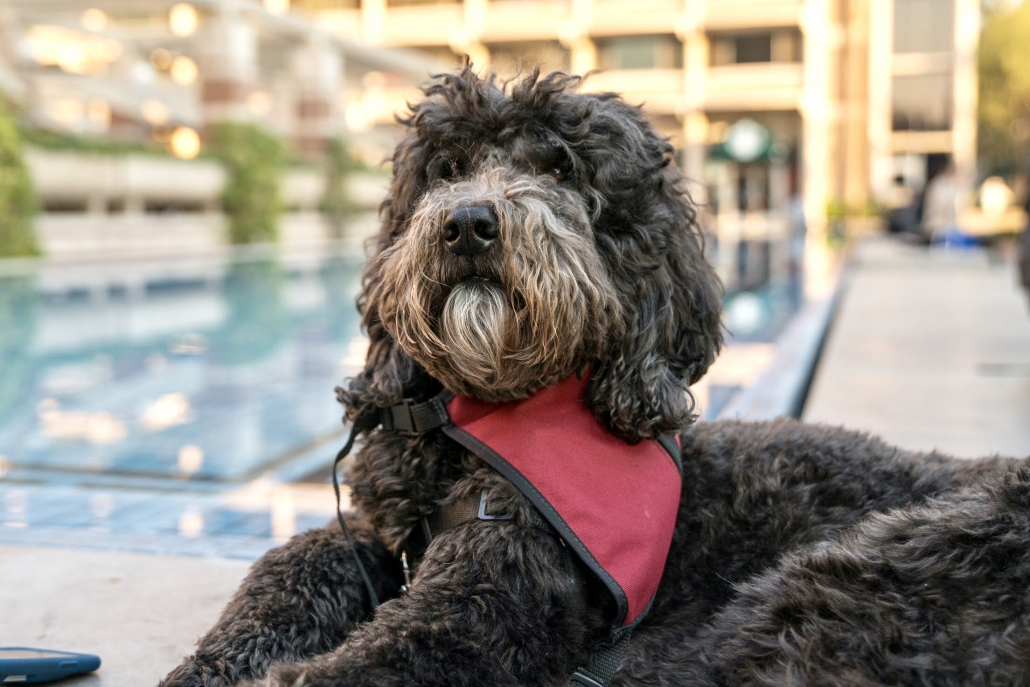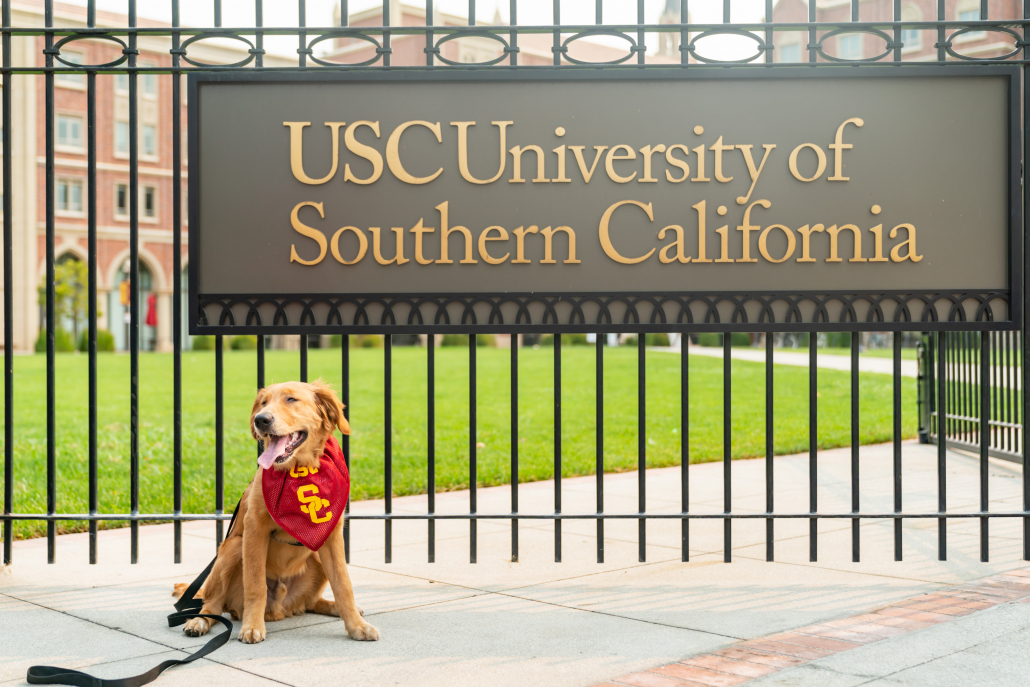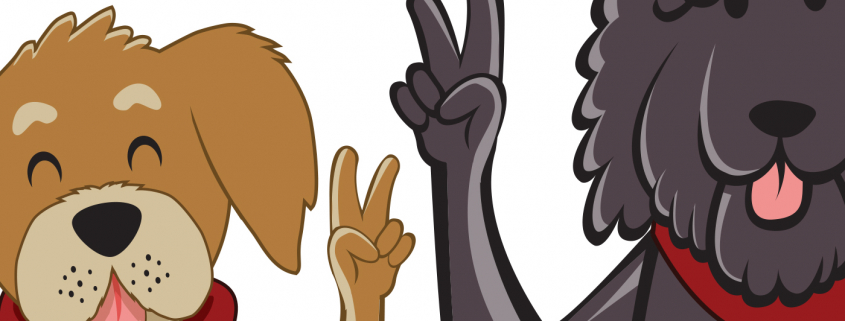Bid Beau goodbye, round of a-paws for Rumi

While most people picture Tommy Trojan or Traveler the Horse when asked about USC’s mascots, students will tell you about Professor Beau, a campus wellness dog who could be found trotting through campus the past four years.
Until this semester, professor Beauregard Tirebiter, a trained goldendoodle, worked with the USC Student Health Office for Health Promotion Strategy and appeared at events ranging from marching band rallies to Career Center office visits. Though the technical term for trained dogs like Beau is facility dog, USC began using the term “Wellness Dog” to make Beau’s role on campus more understandable. Unlike service dogs or emotional support dogs, facility dogs are highly trained to work with groups of people without feeling stressed in environments with high stimulation like a college campus.
On Aug. 19, professor Beau announced his retirement on the Student Health Instagram account. Many students were disappointed that they didn’t get a chance to say goodbye to Beau because of quarantine, but wished him well. Though professor Beau will not be fur-gotten, USC students can expect to build new paw-some memories with USC’s new wellness dog, professor Rumi Tirebiter!
Rumi is a six-month-old flat-coat goldendoodle, who is currently receiving positive reinforcement training through the Canine Good Citizen program. After completing and passing the CGC, Rumi will be an eligible candidate for Therapy Dog training, where he will be learning how to be a great wellness dog that serves the USC community. Some of Rumi’s favorite things to do include going on socially distanced park walks and engaging in training exercises.
According to Dr. Amanda Vanni, Beau’s handler, associate director for Community Engagement within the Office for Health Promotion Strategy, the expressed desire to have a consistent presence of one dog on campus inspired her to start the wellness dog initiative at USC.

“We heard pretty consistently from students that they loved the consistent presence of dogs on campus,” Vanni said. “But in particular, they shared that [when] they felt like they would start to create a bond or a relationship with one particular dog, they [would] never know when that dog was going to be returning [from the] volunteer organization.”
Thus, USC became the first college in the country to introduce a full-time wellness dog on campus, professor Beau, in 2016.
During professor Beau’s time at USC, he participated in scheduled events, visited classrooms and held office hours where students could visit him. Tirebiter Assistants helped facilitate interactions based on commands and tricks Beau learned to perform. Known for his soothing and calm temperament, visiting Beau was the highlight of many students’ campus life at USC.
“Beau was trained to go around to each person in a room, give everyone a little bit of attention, without being very in their face about it,” Vanni said. “He was trained to not [invade] people’s personal space, not to lick, not to bark, or jump up on people. So his training really helped facilitate those types of interactions, to very calmly walk to them and stand close to them so that they can touch him.”
Zoe Laub, a junior majoring in creative writing, remembers first seeing Beau in person at a meet and greet during her freshman year. Laub said that seeing Beau walking around campus and being able to go up to him and say hello helped her relieve stress, especially during finals week.
“I used to follow the page before I got to USC,” Laub said. “I followed it for two years in high school. And when I met him for the first time at this event I went to my freshman year with my suitemates, I was so excited. They put me on the Instagram story in a picture with two of my suitemates. I showed it to all of my family, and I posted it on Facebook.”
One memory Vanni treasures in particular was when an international student came to the office to meet Beau, but expressed that she was nervous because dogs were not commonly kept as pets in her country. Another student then reassured her that though she might be scared, Beau was the perfect dog to meet for the first time because of his gentle and kind demeanor.
“Slowly, but surely, she took that step of courage and reached out and started petting him and began to laugh,” Vanni said. “It was just this beautiful moment to see these two students who clearly have very different upbringings, sharing a scary moment, but a courageous moment for this young woman who never interacted with a dog before. They ended up staying for at least an hour. Talking with him, the students in the room, and petting Beau.”
Alisa Kim, a USC alumna, also noticed the community-building benefits of having a wellness dog on campus.
“[Visiting Beau] also provided another way for other students to meet each other and connect with each other, talking about their own dogs or bonding over loving Beau and having both these dogs in their lives,” Kim said.

While Kim was a doctoral student at the office for health promotion at USC Chan Division of Occupational Science and Occupational Therapy , she conducted a qualitative research study on the impact of a full-time facility dog at a university on the specific needs of the college student population. She discovered that the presence of wellness dogs helped reduce stress, loneliness and homesickness.
“A lot of students talk about how Beau would take their minds off of school and give them a little break from everything that was going on,” Kim said. “There was something about the emotional support of a dog, not needing to talk about your feelings when you go see Beau, and just feeling like they understood what you were feeling, which was a big contrast from more traditional approaches, like counselors and therapists that a lot of students mentioned.”
Beau was also strategic in helping spread awareness on the importance of mental health through Student Health’s Instagram page, and he was a mascot who encouraged people to seek counseling and therapy services.
“Because we had that in-person connection [with Beau,] it made us more excited when we saw a post during quarantine to send it to each other,” Laub said.
What makes a dog in particular such a suitable animal for therapeutic purposes is their aptitude for training, as well as their relatability to people.
“I think a lot of people can just relate to dogs a little bit more,” Kim said. “Of course there are so many other types of pets out there, but dogs are one of the most common pets in the American household, or in the world. So, it is just, I think, a little bit more relatable for students.”
As soon as it is safe for regular campus operations to resume according to the Los Angeles County’s health guidelines, Trojans can schedule appointments with professor Rumi via the link in @beau_usc’s Instagram bio.

